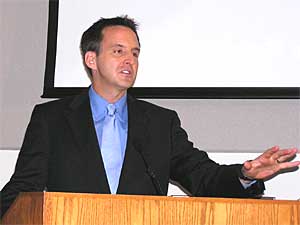January 25, 2005
 |
| Gov. Tim Pawlenty proposed a nearly $30 billion budget Tuesday, to cover the next two years. He uses a combination of spending cuts and proposed casino revenue to cover a $700 million deficit without a state tax increase. (MPR Photo/Mark Zdechlik) |
St. Paul, Minn. — Pawlenty's budget would spend nearly $30 billion over the next two years, an increase of about 6 percent from the current biennium. Pawlenty says Minnesota is emerging from its fiscal problems, but isn't out of the woods yet. He says his budget funds certain priorities without raising taxes.
"It's clear that in times of limited resources, you can't do everything. And you certainly can't do everything well," says the governor.
Pawlenty had said he would not use gambling revenue to balance the budget, but his budget includes $200 million from a one-time casino license fee. He's proposing a new casino in the Twin Cities metropolitan area, to be run by the state and interested tribes.
Pawlenty didn't specify the tribes, but he's been talking to the White Earth, Leech Lake and Red Lake communities in northern Minnesota. He says the other tribes that have the most profitable casinos closer to the Twin Cities aren't willing to share their profits with the state.
"At this point, they are not interested in an arrangement -- a revenue-sharing arrangement with us or with the northern tribes, or the other tribes that don't benefit as greatly -- in exchange for benefits, so we have moved to plan B," says Pawlenty. "Plan B involves a partnership that we are excited about and proud of, with tribal partners that we have been discussing this project with."
The idea was immediately criticized by the Minnesota Indian Gaming Association, a group that includes all of Minnesota's bands except for Red Lake and White Earth.
"The governor's scheme to involve three northern tribes in a metro-area casino is nothing more than a cynical effort to create disunity among tribes and use the poorest Indians in the state as human shields to protect him from the political fallout of gambling expansion," the group said in a statement.
In addition to the casino money, Pawlenty's budget would tap a projected surplus in the health care access fund that pays for MinnesotaCare, the state's subsidized health insurance program. He would also continue sales taxes on alcohol and car rentals, which are set to expire, and increase a surcharge on traffic fines.
On the spending side, Pawlenty's budget would increase funding for K-12 education, higher education, public safety and health and human services. But health and human services spending was projected to go up about 20 percent. Pawlenty's budget scales back spending in that area to a 15 percent increase. To do that, he would reduce eligibility for MinnesotaCare.
Adults without children who would no longer qualify for MinnesotaCare might qualify for General Assistance Medical Care. But that program requires recipients to have limited income, and to spend some of their own money on medical care first, to qualify for state aid.
Human Services Commissioner Kevin Goodno says the state has to do something to rein in rising health care costs. He says the budget protects health care programs for children, the elderly and disabled.
"Quite frankly, we think people who are at 100 to 175 percent of poverty, who are able-bodied, are less vulnerable than those disabled children who are on our programs, or those American Indian kids in our child welfare initiative," says Goodno.
Goodno says the eligibility changes will affect about 27,000 Minnesotans over the next two years.
Groups that advocate for low-income Minnesotans say they're concerned about the impact of the governor's budget. Marcia Avner of the Minnesota Council of Nonprofits says thousands of people will lose state health coverage. She says Pawlenty's proposed austerity on the state level will put pressure on local governments to raise property taxes.
"We think that if you're going to do a tax -- and we need to do taxes -- we need the right taxes and fair taxes," Avner says. "Instead of driving it to the local level where we'll see inequities, because some districts will and some districts won't be able to meet people's basic needs."
DFL legislative leaders called the governor's budget disappointing and incomplete. They say they'll hold hearings on Pawlenty's budget before releasing their own proposal.
(The Associated Press contributed to this report)





